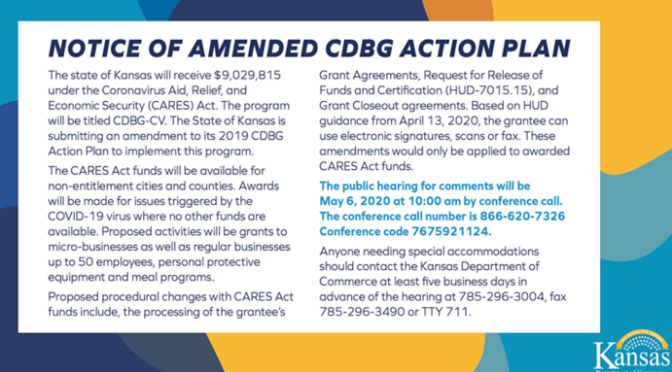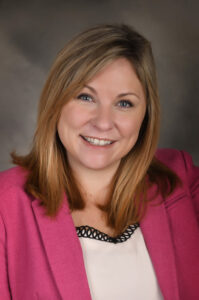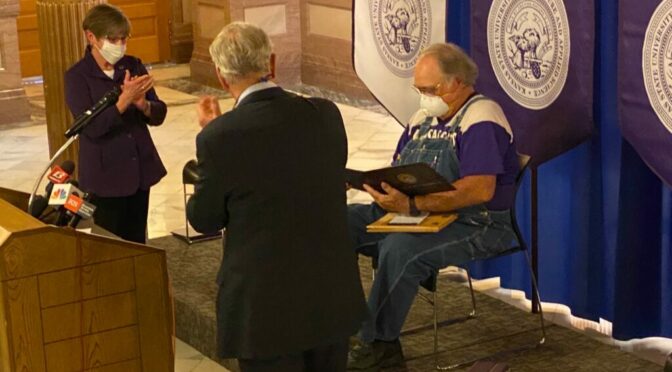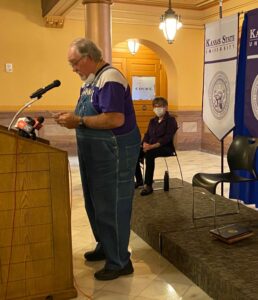This news release from K-State Research and Extension is available online at www.ksre.k-state.edu/news/stories/2020/05/pandemic-guidelines-for-reopening-businesses.html
K-State expert outlines key tips during webinar for Kansas small business owners
MANHATTAN, Kan. – Many of the guidelines that helped Americans get through the COVID-19 pandemic over the past two months will serve as a good guide as businesses throughout the country slowly begin to re-open their doors.
In fact, Londa Nwadike, a food safety specialist with K-State Research and Extension whose academic background is in public health, says avoiding close contact with others and washing your hands regularly will become even more important as Americans begin moving about more regularly.
“Ensure that you are following all guidance, especially as it is being provided by your local public health department,” said Nwadike, who holds a dual extension appointment with Kansas State University and the University of Missouri.
On April 30, Kansas Gov. Laura Kelly announced a phased re-opening of the state’s economy, which continued to emphasize the importance of the six-foot social distancing guideline, and washing hands with soap and water. Kelly’s plan also encourages wearing face masks in public settings and staying home if you feel sick.
Nwadike spoke May 1 during a First Friday webinar hosted by K-State Research and Extension and targeted for Kansas business owners. Among the advice she shared:
- Listen to workers and customers regarding their concerns.
- Communicate your plans with workers, stakeholders and customers.
- Evaluate your situation and implement appropriate steps for re-opening.
“Business owners should actively encourage sick employees to stay home,” Nwadike said, adding that other steps businesses can take include providing protective equipment (face coverings and gloves, for example), providing tissues and trash cans, installing plexi-glass shields for cashiers, and other modifications specific to the business – such as additional space between restaurant tables.
Additional steps that businesses can take, some of which have already been seen in stores that were able to stay open in March and April, include:
- Disinfecting cart handles.
- Encouraging sick customers to not come in.
- Providing sanitizing wipes for customers.
- Placing marks on the floor near checkout areas to guide social distancing.
- Monitoring the number of people in the building.
- Cleaning and stocking bathrooms more frequently.
- Cleaning frequently touched surfaces often, such as door handles, shelves and the credit card terminal.
Nwadike said those practices are important since coronaviruses such as the new strain that causes COVID-19 are generally spread person-to-person through respiratory droplets. It is also thought that it may be possible to get COVID-19 by touching a surface or object with the virus on it, and then touching one’s mouth, nose or eyes – though, she adds, “this is not thought to be the main way the virus spreads.”
“Encourage your customers to shop with their eyes, not their hands,” Nwadike said. “The more we can keep people from touching shelves and products, the less likely we will pick up a virus.”
Nwadike cited a guide being distributed in the Kansas City area that provides good advice for businesses of all sizes. While the information is geared toward the greater Kansas City area, it is a good resource for all business, Nwadike said.
Nwadike and colleague Karen Blakeslee also have published a website, Food Safety and COVID-19, providing numerous resources outlining safe practices related to COVID-19.
-30-
FOR PRINT PUBLICATIONS: Links used in this story
Ad Astra: A Plan to Reopen Kansas, https://governor.kansas.gov/wp-content/uploads/2020/04/Reopen-Kansas-Framework.pdf
#SafeReturnKC, https://bit.ly/SafeReturnKC
Food Safety and COVID-19 (K-State Research and Extension), www.ksre.k-state.edu/foodsafety/topics/covid19.html
K‑State Research and Extension is a short name for the Kansas State University Agricultural Experiment Station and Cooperative Extension Service, a program designed to generate and distribute useful knowledge for the well‑being of Kansans. Supported by county, state, federal and private funds, the program has county extension offices, experiment fields, area extension offices and regional research centers statewide. Its headquarters is on the K‑State campus in Manhattan. For more information, visit www.ksre.ksu.edu
This news release from K-State Research and Extension is available online at www.ksre.k-state.edu/news/stories/2020/05/pandemic-guidelines-for-reopening-businesses.html




